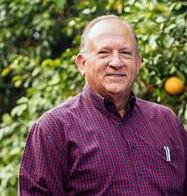Dennis Holbrook
“I was approached by representatives from Texas Tech University, asking to allow my employees to participated in a blind study of agricultural workers. They were testing for pesticide residues, and they were not having a great deal of success or luck in getting participation from a lot of the farmers here. But I told them, ‘Look, I’ll participate in the study, let you test my employees, if you test me as well.’ And the reason for that was that from the time I was a small kid, probably about the time I was 11 or 12 years old, I was driving spray rigs in the summertime for my father’s company. When I was a senior in high school, I worked for a crop duster and I was basically the chemical mixer. I mixed up all the formulations that went in the airplane. So, I wanted to get an idea where I was on the scale. The only result I got back was my own. They sent a letter six months later and indicated that I was in the upper 90 percentile of pesticide residues. . In the beginning, I kept a low profile for as long as I could, because I wasn’t really sure to be honest with you, whether we would be successful. There was really no one at the time that I was aware of that could give you much information. I remember I went to the Texas AgriLife office, which at that time it was the Texas A & M Extension service. I made a request. I asked, ‘Can you obtain information from the archives, as to what was being recommended for citrus production back in the 1930’s and 40’s, before all these chemicals were developed post World War II?’ They asked me why I was interested, and I didn’t really want to come out and say I was looking for organic growing practices but finally they were just not really cooperative. In fact, I told him, ‘’Well, I’m growing citrus organically and I wanted to see what was recommended prior to the chemical revolution.’ Basically, they just kind of pointed me to the door and said goodbye.. . There is no doubt organic is mainstream now. I think that was the golden objective from Day One, was that we wanted to see organic as a mainstream portion of agriculture. And it still evolves, it continues to grow. It is the only part of agriculture that has shown consistent growth and expansion in its marketability, then any other part of agriculture. You cannot point to anything else in agriculture that has had that kind of successful experience over the last 30 years.”
Dennis Holbrook was chairman of the Texas Valley Citrus Committee, which is the governmental agency of USDA over the citrus industry. As chairman, he was selected to be the voice of the industry in a meeting with Hightower concerning TDA’s new pestiicide regulations. Dennis got a notification that Texas Farm Bureau was no longer going to write the insurance that covered drift, because of the new regulations, so he was basically without insurance. It really was quite a contentious meeting. The bad thing about it was that insurance costs went from like $700 a year to like $2,400 a year. There was no justification for the insurance companies to increase their rates so high because nobody had had a problem, but everybody was just fearful. They thought ‘Oh, there’s gonna be all kinds of claims.’ It turned out in the long run, the regulations were not over impactful for the industry; it just was going to cut out a lot of negligence and people who perhaps were not doing the right thing.
